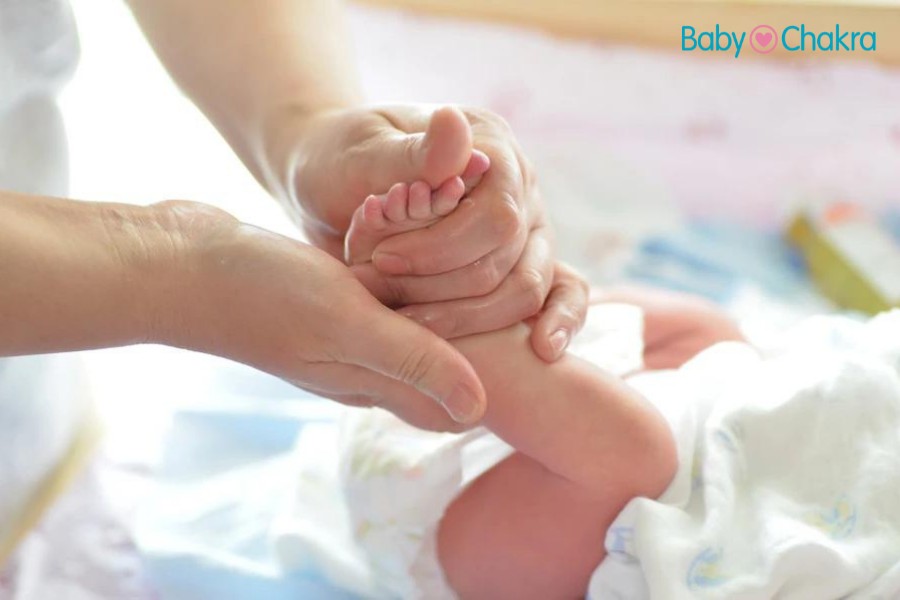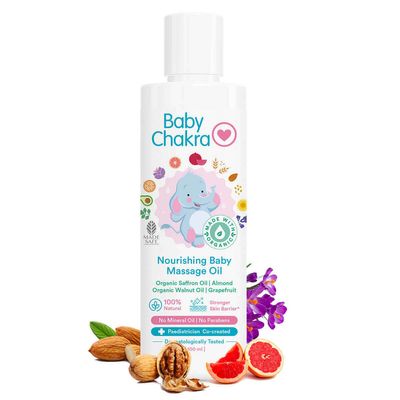
Moringa Oil Is The Perfect Massage Oil For Your Baby: Here’s Why.
19 May 2022 | 4 min Read
Sayani Basu
Author | 607 Articles
Massaging a baby is beneficial for parents and babies alike. It can soothe and relax the little ones, while enhancing communication and strengthening the emotional bond between the mum and the baby.
Paediatricians recommend massaging a newborn baby daily as it is essential for the infant’s psychosocial development as well as their overall healthy growth.
Moringa oil makes for the perfect massage oil for the baby. A little moringa oil goes a long way in a massage, especially if used after bath time to seal in moisture.
Moringa is commonly known as “Drumstick” or “Horseradish” and is considered as an important plant in Ayurveda. Rich in vegetable oil, it has high nutritional values. Plus, it has immense nutritional benefits for the skin and hair. Read on to know more.
What Is Moringa Oil?
In Ayurveda, moringa has been renowned for its miraculous healing and nourishing qualities. Moringa oil is extracted from the seeds of the moringa tree that stays on top of the list of the most useful things obtained from the tree.
Moringa seeds have a high oil content and contain several nutritional compounds, including monounsaturated fats, protein, sterols, and tocopherols.
Produced through a variety of industrial processes, including solvent extraction and cold-pressing, it is light, dry, fluid, and sharp and has a unique ability to penetrate the skin and detoxify it.
Moringa Oil – The Perfect Massage Oil for Your Baby
Studies have shown that massaging babies will make them feel more relaxed and improve their sleep. Moringa oil is the best oil for baby’s delicate and ultra-sensitive skin, that needs extra attention, gentleness and care.
It hydrates, moisturises and deeply nourishes the baby’s skin, and makes for the perfect massage oil. It softens their skin and adds a natural glow.
Moringa oil contains 40% monounsaturated fatty acids, with 70% of that being oleic acid which nourishes your little one’s skin that is still developing. A rich source of nourishment with moisturising, cleansing, and emollient properties, it is also found in massage oils for babies.
An extremely rich source of antioxidants, vitamins as well as minerals, massaging your baby with moringa oil will not only nourish the little one’s skin but also prevent and treat dry skin conditions.
The richness of vitamin E helps in improving skin strength and thickness too.
Moringa oil contains amino acids and helps in proper cell development. A mineral rich vegetable source, it ensures intact metabolism and maintenance of proper growth.
Exhibiting natural antibacterial and antifungal properties, moringa oil can also be used to treat your baby’s diaper rashes. After washing the baby’s bottom with warm water and body wash, mums can apply a thin layer of the moringa oil which can sooth and act as a natural barrier between the skin and the diaper.
High in antioxidants, fibre, and nutrients, moringa oil also helps your little one fight inflammation and irritation related to allergies and even eczema.
Key Takeaways
Moringa oil has a plethora of benefits. Besides being the perfect massage oil for the baby, it helps to heal the little one’s cracked and chapped lips. It acts as a gentle hair conditioner too. Mums can apply a little moringa oil to the baby’s hair and scalp after the shampoo.
So, are you ready to give your baby the moringa massage today? Massage onto the little one’s skin using gentle yet firm strokes and pamper their tender skin.
A


Suggestions offered by doctors on BabyChakra are of advisory nature i.e., for educational and informational purposes only. Content posted on, created for, or compiled by BabyChakra is not intended or designed to replace your doctor's independent judgment about any symptom, condition, or the appropriateness or risks of a procedure or treatment for a given person.

